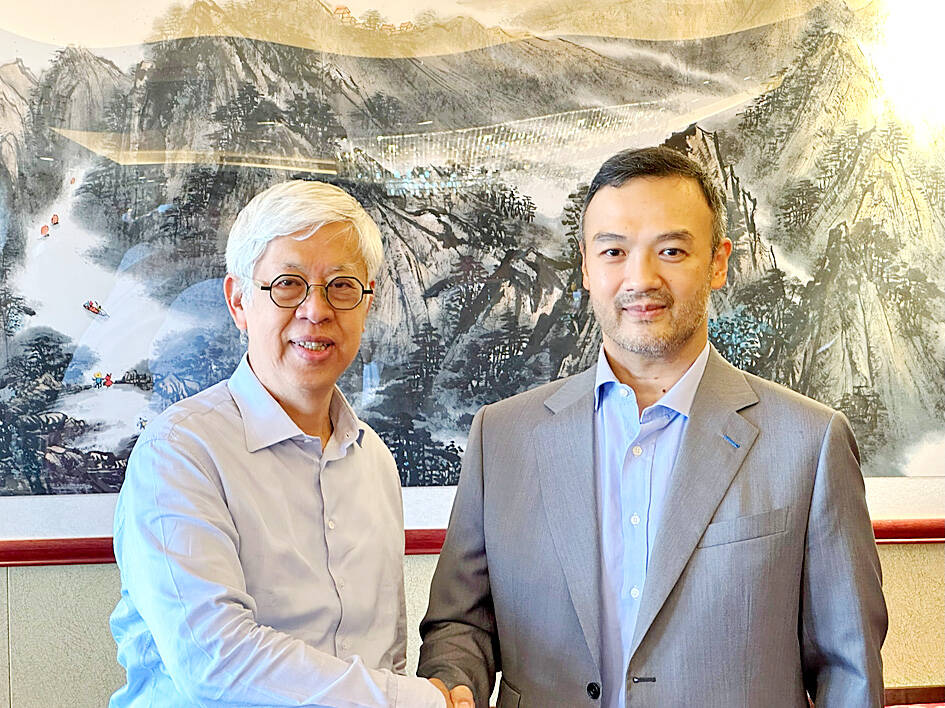Inventec Corp (英業達), a contract maker of computers and servers, yesterday said it expects revenue from artificial intelligence (AI) servers to double this year from last year.
AI servers are to contribute to more than 10 percent of the company’s revenue this year, up from about 5 percent last year, it said, adding that AI server revenue next year would grow by double-digit percentage points.
Overall server revenue might drop slightly or be flat this year, given an unfavorable macroeconomic situation and insufficient supply of central processing units, new chairman Sam Yeh (葉力誠) told reporters after the company’s annual general meeting yesterday.

Photo: CNA
Demand for servers is expected to bounce back next year, in line with improvement in the global economy, said Yeh, whose father, Yeh Kuo-i (葉國一), cofounded the company in 1975.
Servers accounted for more than 40 percent of the company’s revenue last year, the second-biggest revenue contributor after notebook computers, Inventec said.
About 70 percent of its server clients are average enterprises and 30 percent are cloud service providers like Google.
Demand for AI servers mainly comes from cloud service providers, the company said.
Apart from servers, Inventec is also exploring new revenue growth drivers such as applications for gasoline-fueled and electric vehicles, it said.
The company also aims to expand revenue from its automotive segment to more than NT$10 billion (US$326 million) in 2026 from an estimate of NT$2 billion this year, Sam Yeh said.
The company is further expanding its manufacturing to outside of China to cope with a US-China trade dispute. It produces wearable, 5G and smart devices at a factory in Malaysia, but plans to expand capacity at its Vietnam and Shanghai plants in the second half of this year.
Shareholders yesterday approved a cash dividend distribution of NT$1.5 per common share, representing a payout ratio of 87.72 percent based on last year’s earnings per share of NT$1.71.

Taiwan’s long-term economic competitiveness will hinge not only on national champions like Taiwan Semiconductor Manufacturing Co. (TSMC, 台積電) but also on the widespread adoption of artificial intelligence (AI) and other emerging technologies, a US-based scholar has said. At a lecture in Taipei on Tuesday, Jeffrey Ding, assistant professor of political science at the George Washington University and author of "Technology and the Rise of Great Powers," argued that historical experience shows that general-purpose technologies (GPTs) — such as electricity, computers and now AI — shape long-term economic advantages through their diffusion across the broader economy. "What really matters is not who pioneers

In a high-security Shenzhen laboratory, Chinese scientists have built what Washington has spent years trying to prevent: a prototype of a machine capable of producing the cutting-edge semiconductor chips that power artificial intelligence (AI), smartphones and weapons central to Western military dominance, Reuters has learned. Completed early this year and undergoing testing, the prototype fills nearly an entire factory floor. It was built by a team of former engineers from Dutch semiconductor giant ASML who reverse-engineered the company’s extreme ultraviolet lithography (EUV) machines, according to two people with knowledge of the project. EUV machines sit at the heart of a technological Cold

TAIWAN VALUE CHAIN: Foxtron is to fully own Luxgen following the transaction and it plans to launch a new electric model, the Foxtron Bria, in Taiwan next year Yulon Motor Co (裕隆汽車) yesterday said that its board of directors approved the disposal of its electric vehicle (EV) unit, Luxgen Motor Co (納智捷汽車), to Foxtron Vehicle Technologies Co (鴻華先進) for NT$787.6 million (US$24.98 million). Foxtron, a half-half joint venture between Yulon affiliate Hua-Chuang Automobile Information Technical Center Co (華創車電) and Hon Hai Precision Industry Co (鴻海精密), expects to wrap up the deal in the first quarter of next year. Foxtron would fully own Luxgen following the transaction, including five car distributing companies, outlets and all employees. The deal is subject to the approval of the Fair Trade Commission, Foxtron said. “Foxtron will be

INFLATION CONSIDERATION: The BOJ governor said that it would ‘keep making appropriate decisions’ and would adjust depending on the economy and prices The Bank of Japan (BOJ) yesterday raised its benchmark interest rate to the highest in 30 years and said more increases are in the pipeline if conditions allow, in a sign of growing conviction that it can attain the stable inflation target it has pursued for more than a decade. Bank of Japan Governor Kazuo Ueda’s policy board increased the rate by 0.2 percentage points to 0.75 percent, in a unanimous decision, the bank said in a statement. The central bank cited the rising likelihood of its economic outlook being realized. The rate change was expected by all 50 economists surveyed by Bloomberg. The